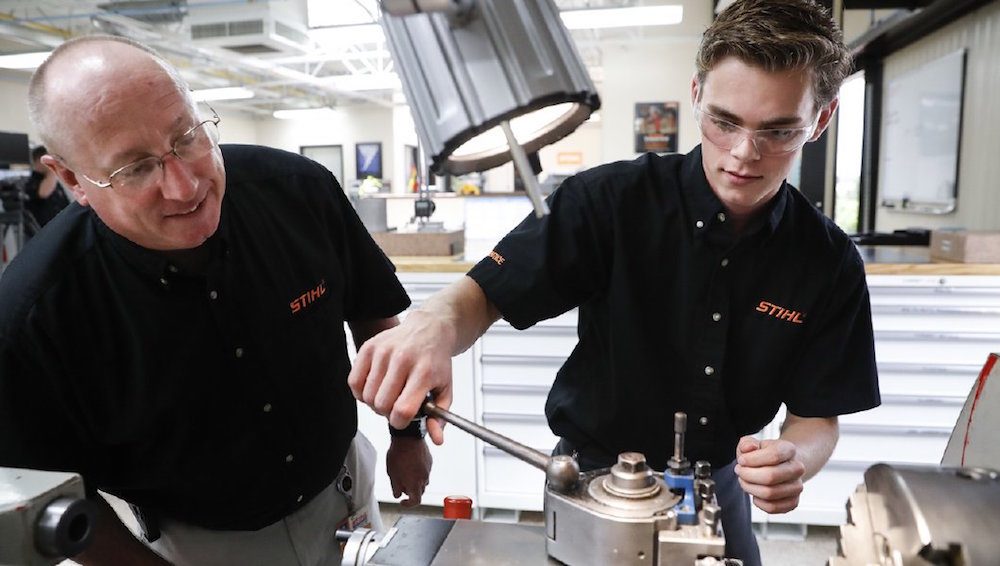Pictured Above: Apprentice Ryan Buzzy, right, works with Skip Johnson, a trainer for the Stihl Inc. apprenticeship program, on a metalworking lathe in their training area at the Stihl manufacturing facility in Virginia Beach, Va., on May 25.
Several states are rising to President Trump's challenge to promote apprenticeship programs as a way to fill a "skills gap" in companies and reduce the unemployment rate, according to a story in the Washington Examiner.
Trump has been pushing blue-collar and non-collegiate jobs as opposed to his predecessor, Barack Obama, who advocated for young people to attend college.
"Our Apprenticeship Initiative will make it dramatically easier for employers, industry groups, and unions to create exciting new apprenticeship programs that place students into high-paying careers. Instead of being racked with crushing student debt, those who participate will earn while they learn — think of that: earn while they learn," Trump said in June.
The White House announced the apprenticeship initiative six months ago. Trump signed an executive order promising tax breaks for participating states and grants for companies that hire apprentices or implement apprenticeship programs.
"College is not the only track to a great career," Labor Secretary Alex Acosta said at a Washington event in October to honor apprenticeship programs. "I was talking to a CEO the other day who said that his company was hiring welders at an opening salary of $60,000. I thought, 'Shouldn't kids know about this?'"
Apprenticeships have presented trouble in the past. Some employers do not want to train and pay an entry-level worker who may leave following the temporary position, while workers may not be inclined to work for free or little pay and not have the possibility of receiving a full-time job in the end.
South Carolina, Arkansas, Kentucky, and Nevada are trying out some ways to follow through on Trump's push.
In South Carolina, the Apprenticeship Carolina program is a division of the state's technical college system. It provides employers with consulting services on how to become certified through the national Registered Apprenticeship System. All businesses in the state, including government agencies, are able to sponsor and register a program. Individual businesses, including trade associations, can jointly sponsor a training committee. That allows them to train apprentices for positions they will need in the future and gives businesses a type of "farm team" to pull from.
More than 28,000 residents have completed one of the 918 programs available in the state. Another 14,000 are currently in apprenticeships.
Arica Carter said completing a training program through Blue Cross Blue Shield gave her a stepping stone to an information technology job. She graduated from college with a computer engineering degree right after the 2001 dot-com bust, when the industry was struggling. After working in civil engineering, she said the apprenticeship gave her a way to get back into the technology industry.
"I would definitely recommend applying. It opens a lot of doors for you — a lot of opportunities," Carter said in an advertisement for the program.
In Arkansas, employers who hire an apprentice who is 17 years old or younger can receive a tax credit of $2,000 or 10 percent of the worker's wages, whichever is less.
Other states are giving tax credits for equipment related to the apprenticeships, instead of money toward human resources.
Missouri provides tax credits of up to 30% of the original value of the equipment or property that is purchased. Nevada will write off the entire purchase.
The states' incentives are being funded by the Labor Department, whose budget for Employment Training Administration could be lower than last year's. The House appropriated $10.8 billion, while the Senate version provided $12 billion. The White House had proposed $9.7 billion, which is 20% lower than the prior year.
Jeffrey Miron, director of economic studies at the Cato Institute and director of undergraduate studies in the Department of Economics at Harvard University, said the best way to get people to apply for apprenticeships would be by repealing minimum wage laws and child labor laws.
"The administration’s efforts will plausibly have mild beneficial effects ... Simply because [it's] treating [the] symptom rather than really going after underlying disease (existing misguided laws that make apprenticeships hard/impossible)," Miron said in an email.
A better way to address industry job shortages would be to not approve any policies that would make it difficult for businesses to hire apprentices in the first place, he said.





